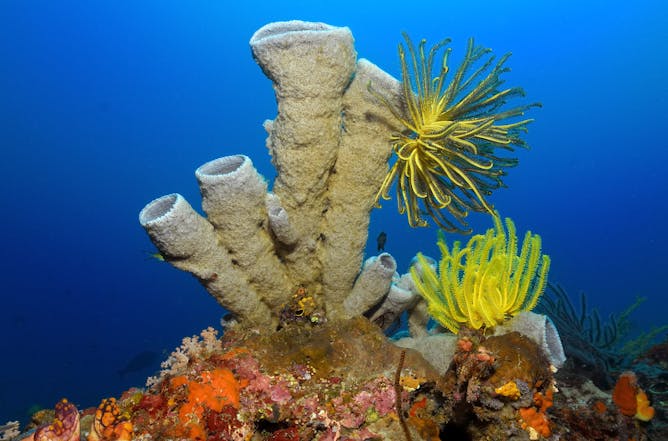|
|
|
|
Life on Earth evolved from a common universal ancestor. While the first lifeforms were simple, microscopic organisms, more complex creatures soon appeared – eventually giving rise to animals. But exactly how this happened and what the first animals looked like has been a matter of intense debate over the past ten years.
There used to be general agreement that our most distant relatives are sea sponges – simple organisms that lack advanced features such as nerve cells, muscles and a gut. But with an increasing wealth of genetic data that allows scientists to compare the DNA of different animals, this idea has been challenged by those who believe our most distant animal relatives are comb jellies – transparent, globe-shaped sea creatures that are superficially similar to jellyfish and more advanced than sponges.
Now a new study has investigated which explanation is the most likely, taking into account that comb jellies evolved more quickly than many other species, which may make them appear evolutionarily older than they actually are.
As stock markets around the world struggle through the pandemic, Bitcoin has seen a steady rise in its price. But it may be virtually impossible to regulate currencies and financial services that were built to avoid regulation. And did you know it’s good for your mental health to celebrate Christmas, even if you can’t meet up with friends and family?
Join us on December 16 for a virtual discussion with leading experts comparing the coronavirus responses in the UK and Australia – advanced registration closes today.
If you value what we do and are able to support us, please donate to The Conversation today. If you’ve already donated, thank you for your support.
|
Miriam Frankel
Science Editor
|

|
|

Tube sponge (Porifera).
kaschibo/Shutterstock
Max Telford, UCL; Paschalia Kapli, UCL
Over the past ten years, scientists have argued about what the earliest animal really was.
|

Unregulated currencies and finance are cool in theory - but who is responsible when it goes wrong?
stock_photo_world / shutter stock
Iwa Salami, University of East London
It is near impossible to regulate currencies and financial services that were built to avoid regulation – but it is increasingly necessary
|

Lucky Business/Shutterstock
Nilufar Ahmed, University of Bristol
Rituals have powerful effects on our emotions, allowing us to relive the happiness of Christmases past.
|
Business + Economy
|
-
Marek Martyniszyn, Queen's University Belfast
The future need not be gloomy. It is possible for Northern Ireland to emerge better off at the end of this process.
|
|
Environment + Energy
|
-
Mark Huxham, Edinburgh Napier University; Imi Melissa Dencer-Brown, Edinburgh Napier University
Done right, offsetting projects can benefit local people and make a measurable difference to carbon emissions.
|
|
Science + Technology
|
-
Jane Ogden, University of Surrey; Amelia Dennis, University of Surrey
Being nostalgic about the past can lead to a sense of loss in tough times.
|
|
Politics + Society
|
-
Balki Begumhan Bayhan, Coventry University
Erdoğan's aggressive foreign policy is one of the reasons Turkey's economy is suffering a downturn.
-
Sarah Zipp, University of Stirling; Camilla Mørk Røstvik, University of St Andrews
The building blocks towards reducing stigma go far beyond providing period products
|
|
Health + Medicine
|
-
Grace C Roberts, Queen's University Belfast; David Courtney, Queen's University Belfast
Two virologists give practical advice for reducing your exposure to COVID-19 this Christmas.
-
Nicholas Wood, University of Sydney; Ketaki Sharma, University of Sydney
Reports of two UK health workers having allergic reactions after receiving Pfizer's COVID vaccine have led to safety warnings for others at risk of anaphylaxis.
-
Adam Taylor, Griffith University
If the vaccine had been widely rolled out, people would think they had HIV when they didn't. But it's not the end of this type of technology.
-
Claudio Angione, Teesside University
Understanding how cells grow under a variety of conditions is necessary for diagnosing disease and developing treatments in the future.
-
Eric Anderson, University of Winchester; Adam John White, Oxford Brookes University; Keith Parry, Bournemouth University
Why tackling in kids rugby must be banned to curb dementia risks.
|
|
|
|
| |
Featured events
|

|
University of Reading (online), Reading, West Berkshire, RG1 6UR, United Kingdom of Great Britain and Northern Ireland — University of Reading
|

|
University of Reading (online), Reading, West Berkshire, RG1 6UR, United Kingdom of Great Britain and Northern Ireland — University of Reading
|

|
Online, York, York, YO10 5DD, United Kingdom of Great Britain and Northern Ireland — University of York
|

|
East Road, Cambridge, Cambridgeshire, CB11PT, United Kingdom of Great Britain and Northern Ireland — Anglia Ruskin University
|
|
|
|
| |
| |
| |
| |
| |
|
|
|
|
|
|
|